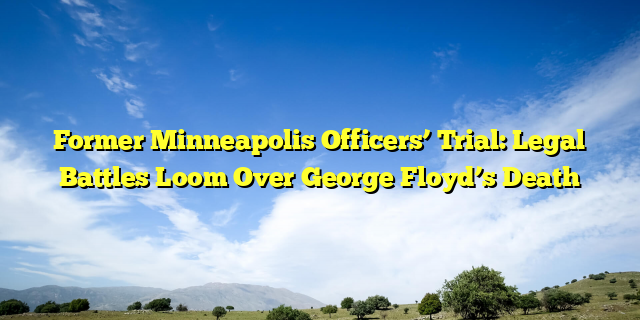The upcoming trial of two former Minneapolis police officers, J. Alexander Kueng and Tou Thao, charged in connection with the death of George Floyd, is already embroiled in a flurry of legal maneuvers. With jury selection set to begin on October 24th, both prosecution and defense teams have filed over 100 motions, many echoing arguments from the previous trials related to Floyd’s death. These pretrial motions seek to limit testimony, exclude evidence, and shape the narrative of the upcoming proceedings.
Former Minneapolis Police Officers Tou Thao (left) and J. Alexander Kueng (right). (Hennepin County Sheriff’s Office via AP, File)
Echoes of Past Trials: Shaping the Legal Landscape
The legal strategies employed in the previous trials of Derek Chauvin and the federal case against Kueng, Thao, and Thomas Lane are heavily influencing the current pretrial motions. Defense attorneys are drawing upon past experiences to anticipate the prosecution’s tactics and seek preemptive advantages. This includes attempts to restrict witness testimony, particularly regarding Floyd’s cause of death and the characterization of events leading up to his death.
Defense Motions: Limiting Testimony and Evidence
Kueng’s attorney, Tom Plunkett, is seeking to prevent state witnesses from directly addressing jurors or engaging in demonstrative actions, such as asking jurors to examine their own necks, a tactic employed by Dr. Martin Tobin, a lung specialist, during Chauvin’s trial. Tobin’s testimony, including his narration of the video depicting Floyd’s restraint and the pinpointing of Floyd’s moment of death, was considered highly influential by the jurors in Chauvin’s case.
Dr. Martin Tobin testifying during Derek Chauvin’s trial. (Court TV)
The defense is also seeking to restrict testimony regarding Floyd’s condition prior to his official pronouncement of death at the hospital. They aim to limit non-physician witness testimony to observations and treatments, excluding opinions on Floyd’s cause of death or whether he was alive or deceased at the scene.
Further defense motions aim to exclude evidence related to the officers’ characters, families, and Chauvin’s qualifications as a field training officer. These arguments stem from the federal trial, where such evidence was presented and subsequently deemed irrelevant by the prosecution.
Prosecution Motions: Controlling the Narrative
The prosecution is seeking to prevent the defense from introducing evidence about the officers’ characters and families, similar to the strategy employed in the federal trial. They are also attempting to bar any questioning about Chauvin’s qualifications as a field training officer, a tactic used by the defense in the federal trial to shift blame to the officers’ training.
The Battle Over Witness Attire and Testimony
The defense is requesting an order prohibiting witnesses from testifying in uniform unless their testimony pertains directly to their official duties. This follows the testimony of Genevieve Hansen, an off-duty firefighter, who testified in uniform during Chauvin’s trial. The defense argues that allowing witnesses to testify in uniform might unduly influence the jury’s perception of their credibility.
Donald Williams testifying during Derek Chauvin’s trial. (Court TV)
Additionally, the defense wants to prohibit witnesses from wearing any signage, citing an instance in Chauvin’s trial where a witness, Donald Williams, wore a “Black Excellence” T-shirt under his dress shirt, allegedly visible to a juror. They also seek to limit Williams’s testimony regarding his martial arts training and understanding of chokeholds, arguing he lacks medical expertise.
Protecting Juvenile Witnesses and Managing Emotional Testimony
The defense is also requesting an order preventing the prosecution from eliciting emotional responses from witnesses, a tactic employed during Chauvin’s trial. They are further seeking to bar the testimony of juvenile bystanders, including a 9-year-old girl present at the scene. The defense argues that calling the child to testify would be traumatizing and unduly influence the jury’s emotions.
The prosecution counters that the testimony of multiple bystanders, including the child, is crucial to demonstrate the widespread understanding of Floyd’s distress and the unreasonableness of the officers’ actions. They argue that the diversity of bystanders—including an older man, teenagers, and the young girl—refutes the defense’s portrayal of a dangerous crowd during Chauvin’s trial.
The Road Ahead: Navigating Complex Legal Terrain
The numerous pretrial motions highlight the complex legal landscape surrounding the upcoming trial of Kueng and Thao. The judge’s decisions on these motions will significantly impact the evidence presented to the jury and the overall narrative of the case. As the trial approaches, the legal battles continue, shaping the course of justice in this highly scrutinized case.
Where Are They Now: The Fate of the Involved Officers
- Tou Thao: Sentenced to 3½ years in federal prison, currently held in Lexington, Kentucky.
- J. Alexander Kueng: Sentenced to 3 years in federal prison, currently held in Lisbon, Ohio.
- Thomas Lane: Sentenced to 3 years on state charges and 2½ years on federal charges, serving concurrently in Littleton, Colorado.
- Derek Chauvin: Sentenced to 22½ years on state charges and 21 years on federal charges, serving concurrently in Tucson, Arizona.
This complex legal saga continues to unfold, with the upcoming trial promising further scrutiny of the events surrounding George Floyd’s death and the actions of the officers involved.
